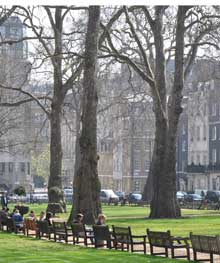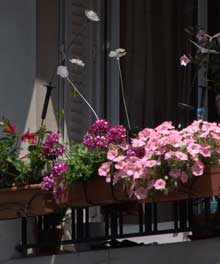On 6th May there was a screening of a French film at the Alliance Francaise of Pondicherry. This was a special screening as the director and the writer of the book on which the film was based were going to be present.
Word of mouth went round and we were told that the writer of the book was actually the director’s wife. Who were this couple? The director, who is primarily an actor, is Patrick Mille and the writer is Justine Levy. Although the surname Levy did ring a bell I didn’t bother to check further. It was only when I searched more information about Justine after she had left Pondicherry that I realised who she was. She is the daughter if the famous writer-philosopher Bernard-Henry Levy!
At the end of the screening we had a question and answer session. And that is when the audience understood that this was, in fact, an autobiographical film! The screenplay was co-written by the couple. Justine levy said that she found it very difficult make the screen adaptation as she had to constantly think of the cost of shooting each scene. Patrick added that he deliberately took many elements from Justine’s other books so the film has several scenes which don’t appear in the novel.
This brings us to the main point of the film. The creators want to show us how life and death are a part of the cycle which has been continuing since time immemorial. It shows us the young woman’s distress at having to deal with the preparation for her mother’s death at the same time as she prepares for the birth of her daughter. Her problem is compounded by the fact that she never really lived a family life because her parents did not live together and her mother lived the life of a bohemian. Her mother had never behaved as a mother. So how was she going to bring up her own daughter?
There were many reasons for which this screening did not meet the appreciation it deserved. Firstly, the audience wasn’t prepared. We knew nothing about the background of the film, that it was a thinly veiled true story, that the writer was the daughter of a famous writer and philosopher and herself a best-selling novelist and that the couple who co-wrote the screenplay were actually telling their own story. Secondly, the majority of people sitting in the auditorium were young men and women who are actually students of French courses of the Alliance Francaise. They had come because they had been told to come and also because the title “Bad Girl” suggested a story of a girl breaking social norms and doing things that society usually frowns on. But the film was not about that at all. The young viewers were disappointed.
The problem lay with the mistranslation of the title. The word “fille” can mean “girl” but it can also mean “daughter”. In this case it should have been “daughter” and not “girl”. Justine Levy explained that it was the story of a woman who feels that she had not been a very good daughter to her mother. She said, “We often talk about ‘bad mothers’ and ‘bad fathers’ but we rarely talk of ‘bad sons’ and ‘bad daughters’. Here was a story of a woman who struggles to be a good daughter. I should have told her that in India we always talk of “bad sons” and “bad daughters”.
Indeed , the message didn’t pass. The screenplay lacked that crucial scene where we could have seen the young woman preparing inwardly to be a mother. The film looked like a string of scenes, put one next to the other, but somehow not being able to show how they connected.
The other problem was that the running time was 1h 45 minutes. The film which was scheduled to start at 7 pm ultimately started at 7.30 due to technical reasons. By the time the Q and A session ended it was almost 10 pm! When the lights came on we saw that all the young people had left. Perhaps there should have been a shorter introduction.
The high point to me was the acting of Bob Geldof. For a singer he was rather good at acting. Even though the role was very close to real life still it needed some acting skills.



























